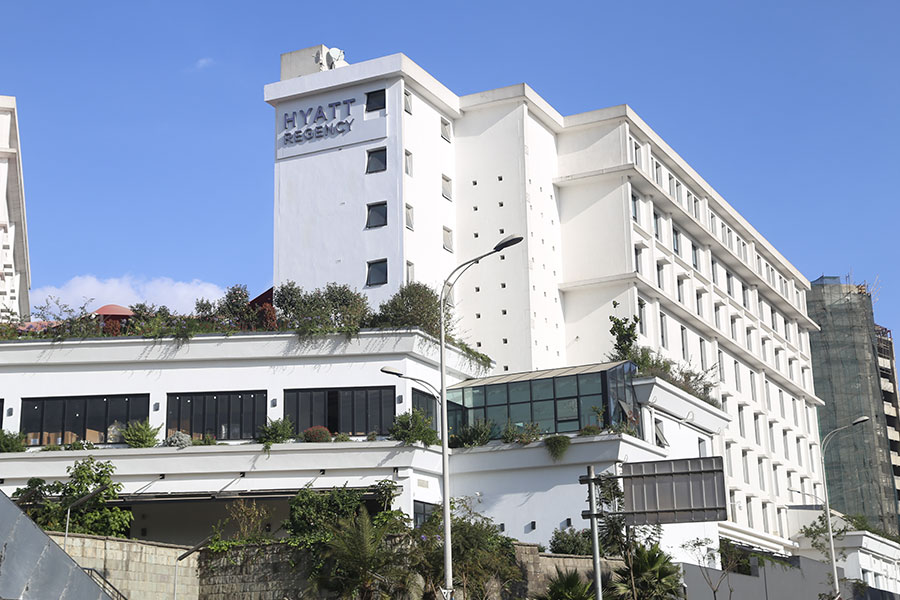
Fortune News | Jun 29,2019
On the evening of Tuesday, December 4, 2019, the walkways of a road that stretches from Mexico to Bole was very busy with people who were on their way back home from the office and others headed somewhere else.
The roads were also crowded by street vendors selling a flurry of fast-moving items, clothes and shoes for both adults and children, a challenge for pedestrians to circumvent.
On the same day, Mesqel Square, a popular site for public gatherings, demonstrations and festivals, was having the same experience.
Among those who crowded the road were youngsters with speakers blaring loud music, small white suitcases that are hard to miss and flyers advertising their screen coating service. Most of them are thronged by people either who seek their service or wanted to see what they do.
The sellers also move from place to place, station the equipment they use to coat phones on the street and call out to passersby to invite them to try the new technology.
One mode of advertisement is hitting the screen of a smartphone with a small hammer or another hard object to show how the coating protects the screen from breaking. The demonstration advertises a chemical that is used to coat a mobile phone screen to protect it from being broken or cracked.
The sidewalk sales associates spray the coating solution, which solidifies on the screen. A protective layer of 13 microns is formed to fill the unevenness of the screen making the screen smoother, increasing its sharpness and making it easy to clean off dirt, grease and bacteria, as stated on the product's label.
The service providers also claim that it is not sticky, it does not absorb water, it protects eyes from harmful radiation, and it can be used for a long time.
Mihret Desalnge, the 23-year-old makeup artist, was among the crowd at Mesqel Square stopping by one dealer to get a nano-coating ultraviolet mobile phone screen protector and disinfector vendors.
Nanotechnology is used to protect clothes, furniture, vehicles, buildings and even mobile phones from numerous environmental factors.
The technology can be applied to different industries and consumer goods. Nano-coating is used in six main fields: textiles, aerospace, vehicles, construction, marine, furniture and mobile phones.
Mihret says that she heard people are using this screen protector widely.
A young man standing with his Nano-Coating Machine and speaker around Sidest kilo.
‘‘My phone broke before, because I didn’t use protective safety glass,” she told Fortune.
Even though she claims that she has doubts about its durability and the safety of her phone, she decided to try it by getting the service from Isayas Kibrom. In his early 30s and living near Abenet, Isayas is one of the many new providers seen daily on the street.
Previously, Isayas was involved in many kinds of work, ranging from producing and directing films to car bidding and the rental business, but he did not take long to join this new screen protection trend after his 10,000 Br mobile phone broke down into pieces.
‘‘I thought that it could happen to anyone,’’ he said.
Isayas charges 150 Br to have a mobile screen coated. He bought the machine for 15,000 Br.
In a single week, he made an income of 10,000, Br indicating the business can easily be transported from one location to another.
In a nano-coating machine, there are two coating appliances, two nano liquid holders, two lense cleaners, two LED flashlights for use at night and two essential dryers.
Isayas learned about the technology and how to use it from watching Youtube videos.
He got his Korean made machine from an individual importer. Though he likes the business, rival retailers who import duplicate machines from another country have become a headache to him.
‘‘What people want is unbreakable and waterproof mobile screens; however, some machines don't guarantee quality and don’t have the original chemicals that will stay longer, which compromises customers' trust," complains Isayas.
Currently, he is trying to compete in the market by reducing his price to 100 Br.
He says that this business is an excellent opportunity for people but fears that it will die off soon.
Nano-Coating Machine box for sale at the Yirga Haile Commercial Center at Merkato.
The Ethiopian Radiation Protection Authority has also recently announced that the institution is in the dark about who imports the nano-coating machines or the liquid that is being sold on the street. The Authority stated that the product has not gone through the formal process in the system.
It also announced that the machines should be examined and investigated to determine how much radiation they generate and their side effects.
Even though the Authority disclosed plans to have the product investigated, Isayas, who believes that the nanotechnology is a relief for many, continues his business.
Abraham Azerf is another young man who recently launched a business to sell the technology. Before he started the business two weeks ago, he was jobless.
He bought a nano-coating machine for 14,000 Br from Yierga Haile Commercial Centre in Mercato.
‘‘I was encouraged when I saw my friends go into the business," he said.
On top of the income he is getting from the business, Abraham like the job, because it gives him flexibility. He can move around and settle on a sidewalk where he is more likely to find customers.
However, since they work on the streets, they face some problems from the regulators, according to those in the business.
‘‘They ask us to hand over the machines and try to drive us away,’’ said Yonas Birhanu, who recently started the business after buying the machine for 13,000 Br from Yirga Haile Commercial Centre.
Abdurahman Muhamed, who has owned an electronics shop at Yerga Haile Commercial Centre for the past five years, is one of the vendors of these machines.
He started selling the product four weeks ago and says that more people were coming to his shop to buy the machine, but now the flow has begun to decline.
"Currently, more retailers are selling the machine," he said, "and so our customers have declined in number.’’
However, officials at the Ethiopian Standard Agency claim that they are not aware of the product and the business that is expanding fast.
Yilma Mengestu, director at the Ethiopian Standard Agency, says that the institution did not hear about this coating machine officially. He also explained that the quality of any product must be authenticated before it is imported.
The National Standardization Council should approve the quality of the product after being tested to check whether it has any side effects on the community, according to Yilma.
‘‘Before any product comes into the country, we have standards set to measure the quality,’’ he says.
Sintayehu Wallelign, an IT expert and a lecturer at the University of Gonder, says that the products have to be examined and certified before being used to avoid damage from side effects.
"The government must ensure the level of quality before importing goods," he says.
nano-coating is a chemical composition that might create unwanted smells when the sun touches it, affect health when it is touched, and also might cause damage to phones and the environment, according to Sintayehu.
“Nanotechnology is not yet fully implemented and requires caution," he said. "The government has the responsibility of making sure that illegal trade does not spread.’’
Even though the government plans to investigate the product and experts recommend the government regulate the business, Abraham and Isayas are enjoying the business bonanza.
At the end of last week, Abraham went to Jimma town, in Oromia Regional State, to exploit this business opportunity, viewing the town as another market ripe for sales.
PUBLISHED ON
Dec 14,2019 [ VOL
20 , NO
1024]

View From Arada | Dec 04,2022

Fortune News | Nov 04,2023

Fortune News | Dec 29,2018

Radar | Jun 07,2020

Fortune News | Dec 23,2023

Dec 22 , 2024 . By TIZITA SHEWAFERAW
Charged with transforming colossal state-owned enterprises into modern and competitiv...

Aug 18 , 2024 . By AKSAH ITALO
Although predictable Yonas Zerihun's job in the ride-hailing service is not immune to...

Jul 28 , 2024 . By TIZITA SHEWAFERAW
Unhabitual, perhaps too many, Samuel Gebreyohannes, 38, used to occasionally enjoy a couple of beers at breakfast. However, he recently swit...

Jul 13 , 2024 . By AKSAH ITALO
Investors who rely on tractors, trucks, and field vehicles for commuting, transporting commodities, and f...

Jul 5 , 2025
Six years ago, Ethiopia was the darling of international liberal commentators. A year...

Jun 28 , 2025
Meseret Damtie, the assertive auditor general, has never been shy about naming names...

Jun 21 , 2025
A well-worn adage says, “Budget is not destiny, but it is direction.” Examining t...

Jun 14 , 2025
Yet again, the Horn of Africa is bracing for trouble. A region already frayed by wars...